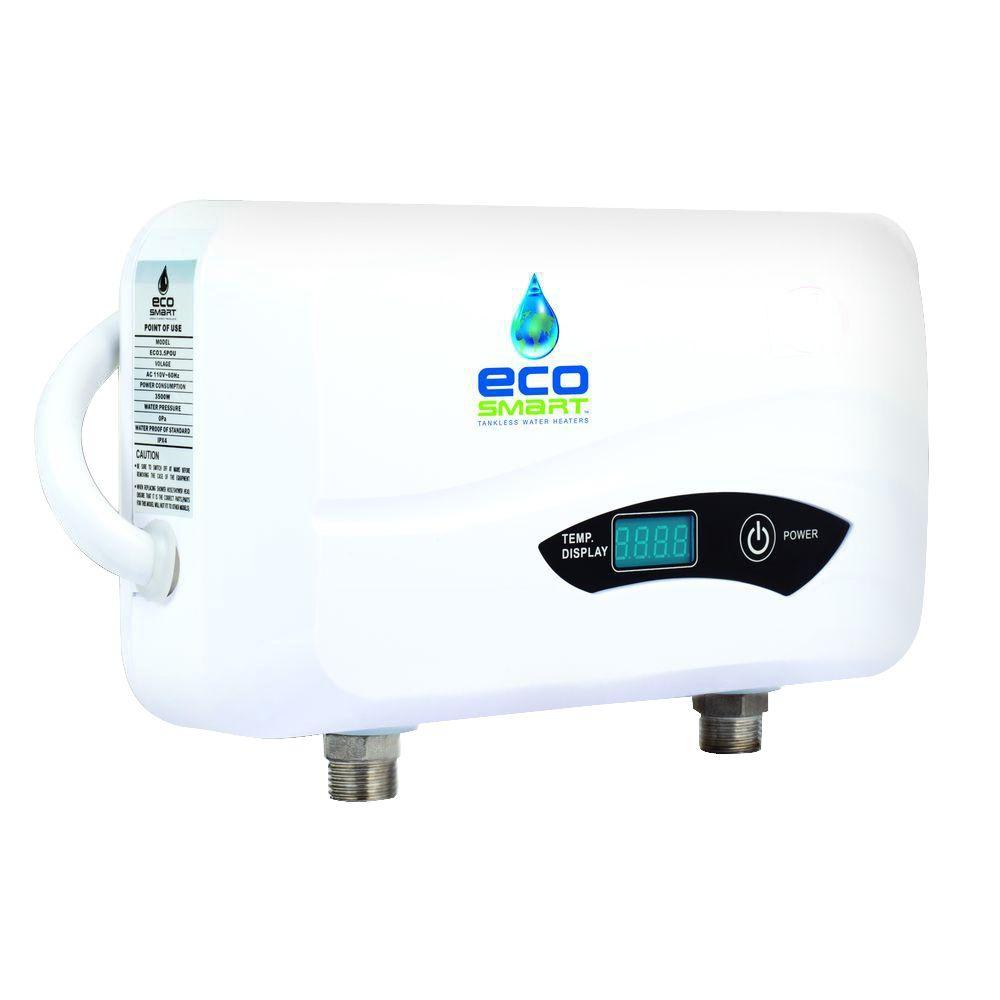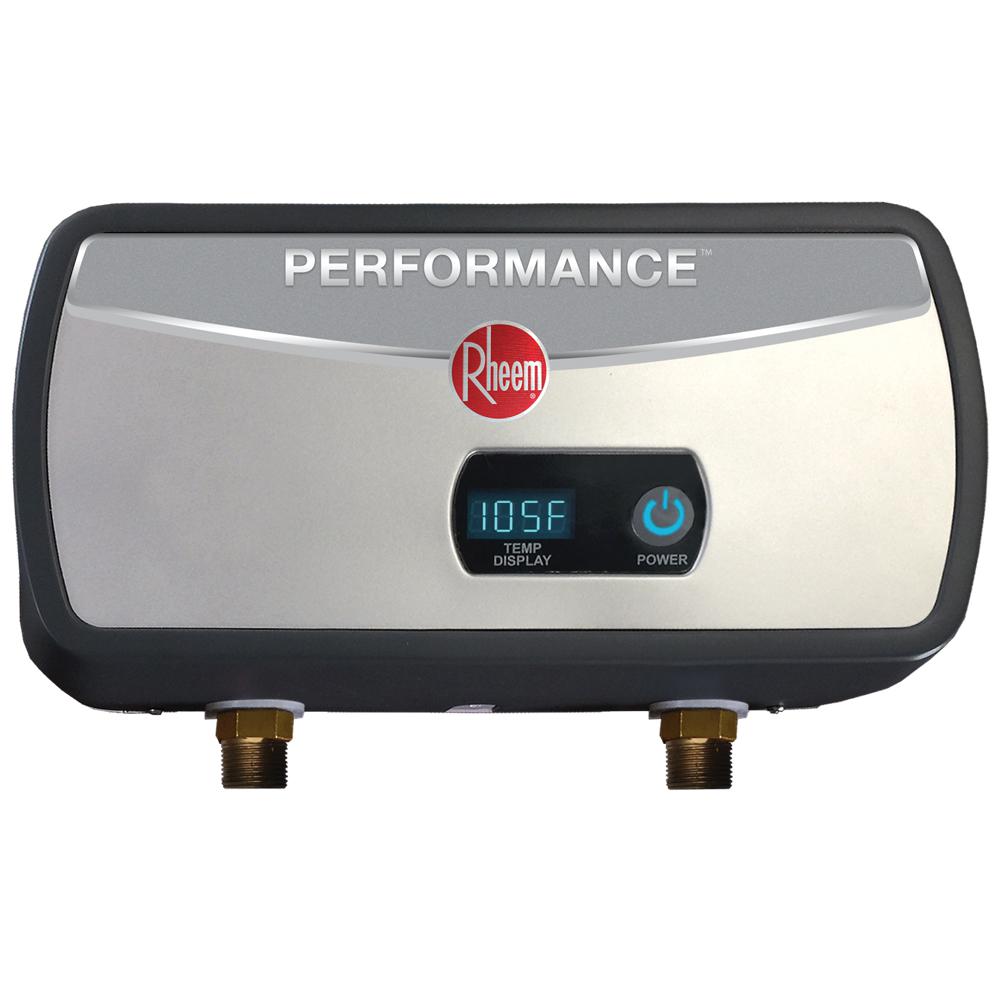point of use electric tankless water heater
EcoSmart 3.5 kW 0.5 GPM Point-of-Use Electric Tankless Water Heater-POU
Lorem ipsum dolor sit amet, consectetur adipiscing elit. Integer ut fringilla leo. Fusce lacinia justo neque, nec gravida justo bibendum non. Fusce sit amet nibh eu felis dignissim blandit. Pellentesque eleifend gravida tellus id tristique. Donec aliquet arcu vel rhoncus commodo. Sed gravida felis non orci aliquet, at ullamcorper quam consectetur.
Rheem Performance 6 kW 1.0 GPM Point-Of-Use Electric Tankless Water
Lorem ipsum dolor sit amet, consectetur adipiscing elit. Integer ut fringilla leo. Fusce lacinia justo neque, nec gravida justo bibendum non. Fusce sit amet nibh eu felis dignissim blandit. Pellentesque eleifend gravida tellus id tristique. Donec aliquet arcu vel rhoncus commodo. Sed gravida felis non orci aliquet, at ullamcorper quam consectetur.
12 Frequently Asked Questions about Electric Tankless Water Heaters
1. How does an electric tankless water heater work?

An electric tankless water heater works by directly heating the water as it flows through the unit. When the hot water tap is turned on, cold water enters the heater and passes through a series of electric heating elements which rapidly heats the water to the desired temperature. The heated water then flows out of the unit and to the desired faucet or appliance.
Key points to consider:
- Electric tankless water heaters provide hot water on demand, eliminating the need for a storage tank.
- They are energy efficient as they only heat the water when needed.
- Installation may require upgrading the electrical capacity of your home.
Case study: John recently installed an electric tankless water heater in his small apartment. He noticed a significant reduction in his energy bills and never runs out of hot water, even when taking long showers.
2. What are the benefits of using an electric tankless water heater?

The benefits of using an electric tankless water heater include:
- Energy efficiency: Electric tankless water heaters only heat water when needed, reducing energy consumption and utility costs.
- Unlimited hot water: With a tankless system, you'll never run out of hot water during showers or other high-demand activities.
- Space-saving: Tankless water heaters are compact and can be installed in small spaces, freeing up storage space.
- Long lifespan: Electric tankless water heaters typically have a longer lifespan compared to traditional storage tank heaters.
Case study: Sarah upgraded to an electric tankless water heater in her home. She was able to free up some space in her utility room and noticed a decrease in her monthly energy bills.
3. Are electric tankless water heaters suitable for a large household?
An electric tankless water heater's suitability for a large household depends on several factors:
- Flow rate: Ensure the tankless unit can provide enough hot water simultaneously to meet the demands of multiple fixtures or appliances.
- Electrical capacity: Large households may require a higher electrical capacity to accommodate the power requirements of an electric tankless water heater.
- Usage patterns: Understand the hot water usage patterns in your household, including peak demand times, to choose an appropriate tankless model.
Case study: The Johnsons, a family of six, opted for an electric tankless water heater. After considering their flow rate and electrical capacity needs, they installed two tankless units to ensure an adequate supply of hot water for everyone.
4. Can an electric tankless water heater be used for a single faucet or appliance?
Yes, electric tankless water heaters can be used for single faucets or appliances referred to as "point-of-use" units. These small, specialized units are installed directly at the desired location, providing instant hot water without the need for a central tankless system. Point-of-use units are ideal for isolated applications like a bathroom sink or kitchen faucet.
Key points to consider:
- Point-of-use electric tankless water heaters have lower flow rates and wattage compared to whole-house units.
- They are cost-effective solutions for delivering hot water to a specific location without the need for extensive plumbing modifications.
- Installation usually requires a dedicated electrical circuit.
Case study: Mark wanted hot water for his new outdoor kitchen sink. He installed a point-of-use electric tankless water heater, ensuring instant hot water for washing dishes and cooking outdoors.
5. Are electric tankless water heaters more expensive to install?
While the upfront cost of an electric tankless water heater may be higher than a traditional storage tank heater, the long-term savings in energy costs can offset the initial investment.
Factors affecting installation cost:
- Electrical upgrades: Installing an electric tankless water heater may require upgrading the electrical capacity of the home, which can increase installation costs.
- Plumbing modifications: Depending on the existing plumbing setup, some modifications may be needed to accommodate the tankless unit.
- Installation complexity: The accessibility and location for installation can impact the overall installation cost.
Case study: David decided to switch to an electric tankless water heater. While the installation cost was slightly higher, he was able to recover the expenses through energy savings within a few years.
6. Can an electric tankless water heater be installed outdoors?
Not all electric tankless water heaters are designed for outdoor installation. However, some models are specifically designed to withstand outdoor conditions and can be safely installed outdoors. It is important to choose a model specifically rated for outdoor use.
Points to consider:
- Outdoor installation requires proper protection against the elements, such as rain, snow, and extreme temperatures.
- Check the manufacturer's specifications to ensure the unit can handle outdoor installation.
- Outdoor installations may require additional venting or protection to meet safety codes.
Case study: Lisa wanted to install an electric tankless water heater in her backyard pool house to provide hot water for showers. She chose a model specifically designed for outdoor use, allowing for safe and reliable operation.
7. What maintenance is required for an electric tankless water heater?
Maintenance requirements for electric tankless water heaters are generally minimal compared to traditional storage tank heaters. However, regular maintenance can help prolong the lifespan and ensure optimal performance:
- Flush the unit: Periodically flushing the tankless water heater can remove sediment buildup and maintain efficiency.
- Clean inlet filters: Inlet filters should be checked and cleaned regularly to prevent clogging that may hinder performance.
- Check for leaks and proper venting: Inspect the unit for any leaks and ensure proper venting to maintain safety and efficiency.
Case study: Emily scheduled an annual maintenance service for her electric tankless water heater. During the service, the technician flushed the unit, cleaned the filters, and checked for any potential issues, ensuring its optimal performance.
8. Do electric tankless water heaters require a specific voltage or electrical circuit?
Electric tankless water heaters typically require a specific voltage and electrical circuit to operate efficiently and safely. It is crucial to follow the manufacturer's guidelines and consult a licensed electrician for proper installation.
Key points to consider:
- Most electric tankless water heaters require 220-240 volts for optimal performance.
- Installation may require a dedicated electrical circuit to handle the power demands of the tankless unit.
- Consulting a licensed electrician is recommended to ensure code compliance and safety.
Case study: Michael purchased an electric tankless water heater and hired an electrician to install the proper electrical circuit to meet its voltage requirements. The electrician ensured the installation complied with safety standards.
9. Are there any limitations to using an electric tankless water heater?
While electric tankless water heaters offer numerous benefits, they also have some limitations to consider:
- Simultaneous use: The flow rate of electric tankless water heaters may limit their ability to supply hot water for multiple high-demand fixtures simultaneously.
- Cold climates: In extremely cold climates, the incoming cold water temperature may require a larger tankless unit or additional measures for adequate heating.
- Electrical capacity: In some cases, older homes may require electrical upgrades to accommodate the power demands of electric tankless water heaters.
Case study: Amy lives in a cold climate and wanted an electric tankless water heater. After consulting with an expert, she opted for a higher-capacity unit to ensure sufficient hot water supply during the cold winter months.
10. Can an electric tankless water heater save energy?
Yes, electric tankless water heaters can save energy compared to traditional storage tank heaters. Key energy-saving features include:
- On-demand heating: Electric tankless water heaters only heat water when it is needed, avoiding the standby heat loss found in storage tanks.
- Elimination of standby power: Tankless units do not require constant heating, reducing energy consumption when hot water is not in use.
- Energy-efficient design: Advanced heating elements and control systems improve overall energy efficiency.
Case study: Jennifer replaced her old storage tank heater with an electric tankless water heater. She noticed a significant decrease in her energy bills, especially during periods of low hot water demand.
11. Are electric tankless water heaters suitable for off-grid or solar-powered systems?
Electric tankless water heaters can be suitable for off-grid or solar-powered systems with some considerations:
- Power availability: Off-grid systems must have an adequate power supply to meet the electrical demands of the tankless unit.
- Solar compatibility: Ensure the electric tankless water heater is compatible with solar installations, particularly regarding voltage requirements.
- Battery backup: Consider integrating a battery backup system to ensure hot water availability during periods of low power generation.
Case study: Jack lives off-grid and recently installed a solar power system. He chose an electric tankless water heater that was compatible with his solar installation, allowing him to efficiently utilize his renewable energy source while enjoying hot water on demand.
12. How long do electric tankless water heaters last?
The lifespan of an electric tankless water heater depends on various factors, including usage patterns, maintenance, and water quality:
- Typically, electric tankless water heaters have a lifespan of 20 years or more, which is longer compared to traditional storage tank heaters.
- Proper maintenance, regular flushing, and cleaning can help extend the lifespan of the unit.
- Water quality, particularly the presence of hard water and sediment, can affect the longevity of the unit.
Case study: Mike had been using his electric tankless water heater for 15 years without any issues. He regularly maintained the unit and ensured the water quality was optimal, which contributed to its extended lifespan.
Conclusion
Electric tankless water heaters offer numerous advantages, including energy efficiency, unlimited hot water supply, and compact size. However, it is important to consider factors such as flow rate requirements, electrical capacity, and installation costs before making a decision. Regular maintenance and proper usage can ensure the longevity and optimal performance of these innovative water heating systems.